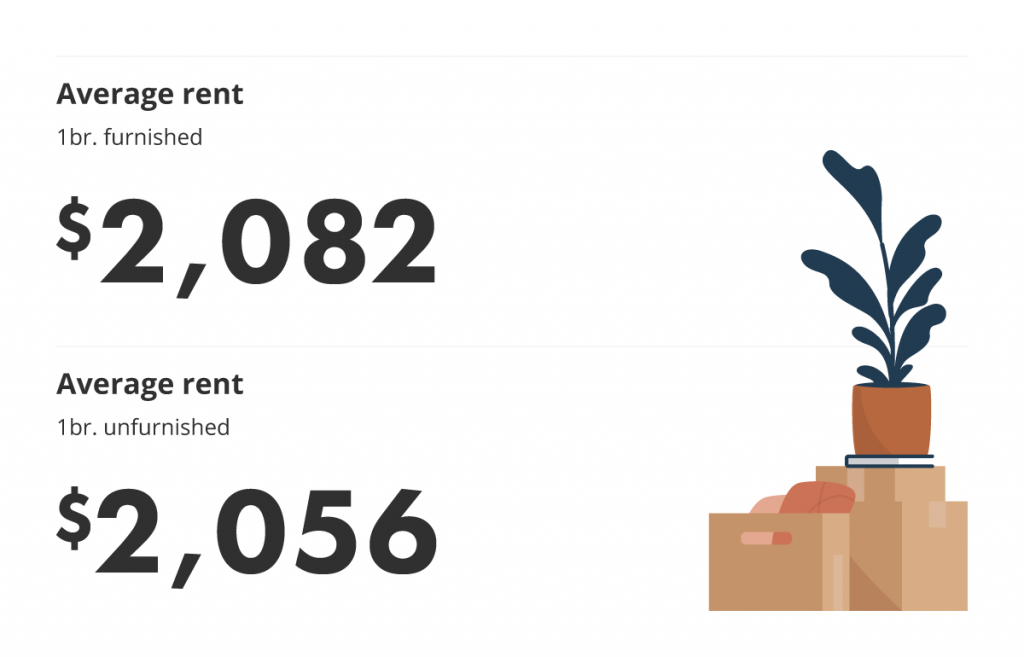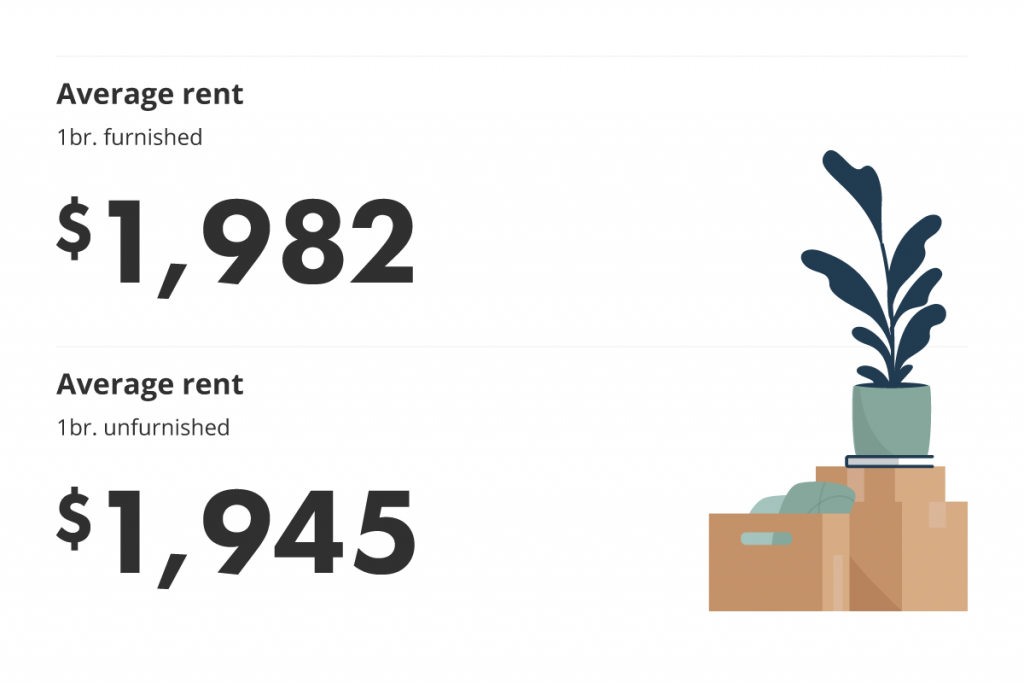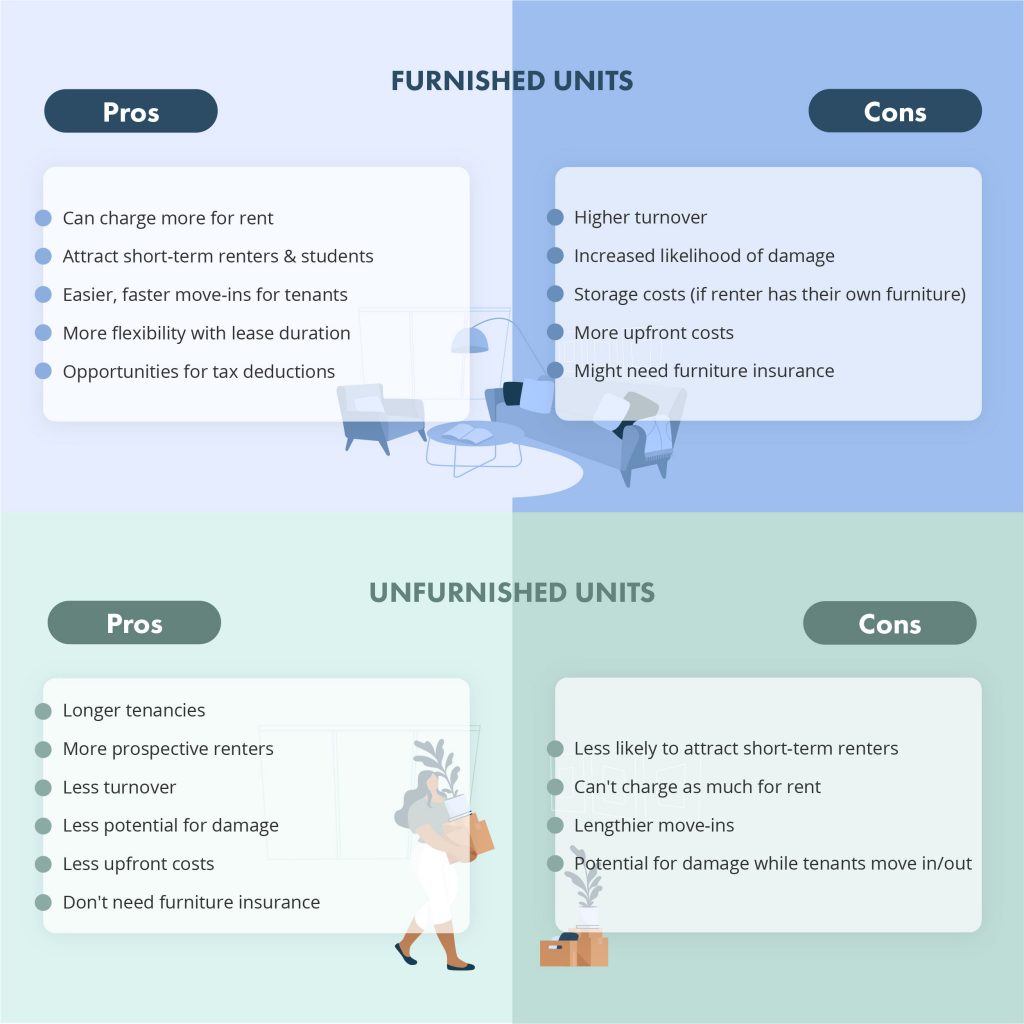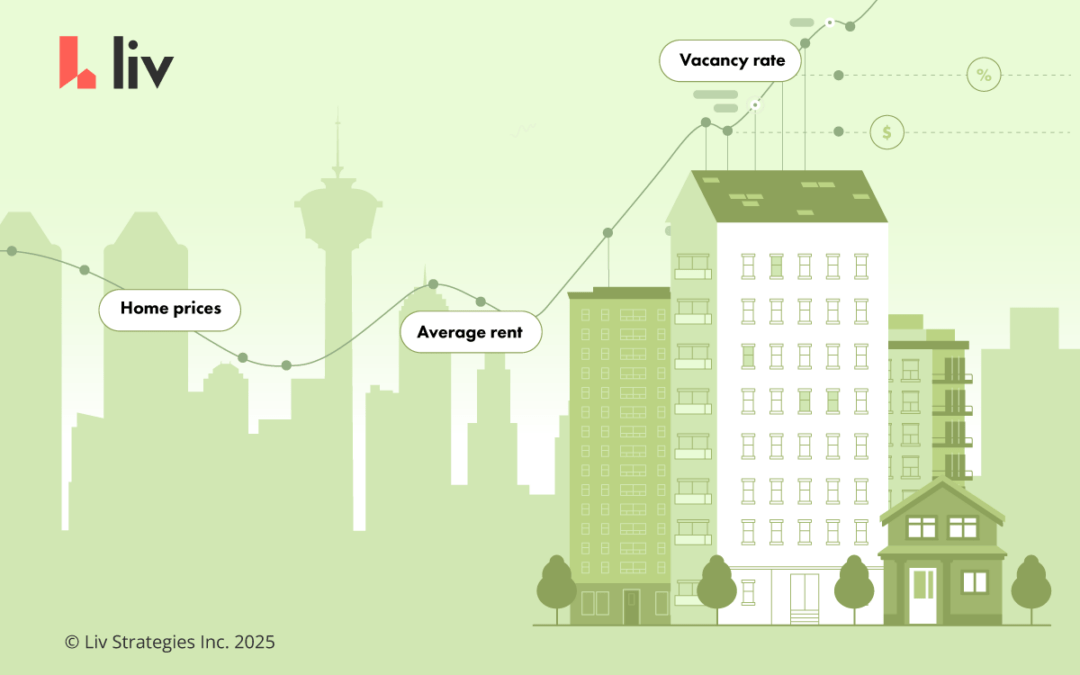Furnishing a rental property is a considerable expense. Should you spend the money, or let your tenants furnish the unit themselves? We’re liv.rent and we’re here to make facilitate a smoother rental process from start-to-finish, for both landlords and tenants. If you’re on the fence about whether you should rent your unit furnished or unfurnished, this guide will hopefully help make your decision a little easier.
Table of Contents
What is a furnished apartment?
Furnished vs unfurnished price difference
What to include in tenancy agreements for furnished units
What is a furnished unit?
A furnished apartment has enough of the essential pieces and furnishings inside for people to live there comfortably without moving in their own furniture. For example, a furnished bedroom would likely come with a bed, mattress, and perhaps a dresser and a nightstand — at the very least.
Many furnished units you can find on various rental platforms are from subletters, or suites within someone’s primary residence. However, many landlords rent their units furnished as well as a means of increasing the profitability of their rental property. Generally, furnished units attract people moving to the city for the first time, new renters, students, and newcomers to Canada.
Furnished vs. unfurnished price difference
Every rental market is different, and it’s important to check the price difference between furnished and unfurnished rentals in your area when deciding whether or not to furnish your unit.
At liv.rent, we publish monthly rent reports in Vancouver, Toronto, and Montreal. For June 2022 in Vancouver, a furnished one-bedroom went for an average of just $26 more than an unfurnished one per month. With this minuscule price difference, it’s up to landlords whether or not they wish to furnish their unit. Still, there are plenty of other benefits to renting your unit furnished as you’ll see below.

Toronto in June 2022 was a similar story, with a price difference of $37 more for a furnished unit; meaning that it might be a good idea to forego furnishing your unit unless you either already have the furniture, or want to take advantage of some of the other benefits of renting your unit furnished.

What to include in tenancy agreements for furnished units
If you decide to rent out a furnished suite, you may want to make some amendments to your standard lease agreement. These amendments will serve to protect your additional investments in the furnishings and fixtures you put in the suite and guarantee your peace of mind later on.
For example, you could insert a rule that all the furniture is to remain indoors and away from heating and ventilation systems, to protect from unlikely but unwelcome incidents.
It’s also a good idea to include a list of the pieces of furniture in the unit and their condition. Then, you can set the expectation that everything remains in tip-top shape. That way, a tenant may be liable for excessive wear and tear or damage to furniture. You could also stipulate that they report back any damage, for example, if a table leg breaks, they have to let you know rather than throwing out the table without telling you.

Benefits of renting a furnished unit
- You can demand higher rent. A well-furnished property rents for 25 to 75% more than an unfurnished property. Across Canada, the difference in rent between the average furnished and unfurnished unit is around $400 – that’s an extra $4,800 a year! However, the higher the rent, the less likely the tenant is to stay long-term.
- More short-term rentals. If you are aiming to be in the short-term rental business (6-12 month leases), furnished units help attract more short-term rentals as renters don’t have to move furniture.
- Rent it out quicker. It may be rented more quickly as tenants can save on costs and time associated with furnishing. First-time renters will find furnished options less daunting when all they need is to bring their personal belongings.
- Inventory of furnishings. When the tenancy ends, you will have the option to use the furnishings for yourself or use them in your other rental properties.
- Tax deductions. You can deduct a percentage of the cost of goods for tax purposes. It’s a good idea to know exactly which tax deductions are available for you.
Landlords & Property Managers
Advertise your rental for free on liv.rent – an all-in-one rental platform.
Benefits of renting an unfurnished unit
- Longer tenancy. Tenants may stay longer as they’ve furnished the place to suit their needs and space. Furnished properties are typically rented as a temporary measure by travelling professionals or students who aren’t planning to stay for long, or people moving between houses and waiting for furniture to arrive from a long-haul move. On the other hand, unfurnished units are geared towards tenants who want to make the space their own since they’ll be staying for a set period of time.
- Larger applicant pool. Since most renters already have furniture, you’re casting a much wider net by renting your unit unfurnished. While furnished units may be attractive for rental properties close to universities and colleges, the majority of renters won’t need the furnishings.
- No need for furniture insurance. Without costly furniture in the unit, there’s no need to worry about insuring it or amending your lease to include additional rules or stipulations.
- Avoid wear and tear concerns. You don’t need to worry about wear and tear on your belongings.
- No carrying costs. Carrying costs can be transferred to the tenant whereas when the unit is furnished, the expectation is that the higher rent includes all utilities, cable/internet etc.
- Longer leases, less tenant turnover. One-year leases are most common for unfurnished properties whereas you’d likely be negotiating shorter terms for furnished apartments.
- Less management involved. Unlike furnished units which generally experience higher tenant turnover, unfurnished properties require less management.
Should you rent furnished or unfurnished?
Consideration 1: Target market and location
Typically, smaller properties, near the downtown core and amenities, attract younger, more mobile tenants who are more likely to enjoy the convenience of a furnished apartment. The same goes for rental properties in more student-friendly neighbourhoods, as those attending from out of town will usually want somewhere they can just move into and out of without worrying about furniture.
Landlords with larger apartments or houses could benefit from leaving them unfurnished. Tenants for these types of units are likely to be older and may have families of their own, and more likely to have accumulated furniture over the years.
Do your due diligence and evaluate your market, including knowing the latest rental averages, before making a decision.
Consideration 2: Additional costs
While a furnished unit has the potential to fetch a much higher market rental rate than an unfurnished one, there are additional upfront costs involved that you’d have to recuperate first before you see a significant profit.
Also, as tenants damage or create expected wear and tear, you will also have to update or replace pieces and fixtures as you go. Landlords can within reason use part of a damage deposit to replace some items and can write others off at tax time.
Read more: The Best Tax Deductions for B.C. Landlords
Whether you rent your unit furnished or unfurnished, using liv.rent to streamline your rental process will save you precious time and money. Learn more about how to get started with liv.rent today.

Rethink The Way You Rent
Not on liv.rent yet? Experience the ease of digital applications & contracts, verified tenants & landlords, virtual tours and more – all on one platform. Sign up for free or download the app.
Subscribe to receive the latest tenant & landlord tips and get notified about changes in the Canadian rental market.
>> Stay up-to-date on the average rent in Vancouver, Toronto and Montreal: Rent Reports.



I didn’t think about how furnished properties allow tenants to move in more quickly due to the fact that the property is already furnished with the essentials. I am thinking about renting a furnished property while I spend a few months in a different state. I think that having the ability to quickly move in and out of the property without having to worry about transporting furniture will relieve a lot of stress.
I typically find that rental furnishing gives tenants an outlet for creativity and personal style in an otherwise cookie-cutter space. At Newmark Moses Tucker Partners, we offer commercial and residential units for rent, and we find that often renters have strong opinions, and it is easier to rent unfurnished spaces where the tenant can bring their own furniture with their own unique style. While sometimes we have tenants that would rather not deal with purchasing their own furniture, finding a way to move it in or out, etc. more often than not, unfurnished are more preferred, and often more profitable with long-term leases. Great article with lots of useful pros and cons.
Can I charge full month rent for security deposit since it’s fully furnished my 2bedroom I can get full month as a security deposit guys. Thanks if anyone can answer my question?
Hi David,
unfortunately, furnished or unfurnished, the Residential Tenancy Act prohibits collection of any amounts above 1/2 month’s rent for security and the same amount for the pet damage deposit. Give us a call and we can help you out with tenant placement and property management – 778 980 9100
For a furnished property, a one-month notice period is required. For an unfurnished property, a one-month or three-month notice period is required depending on the zone you live and the circumstances (for example, in Paris it is only one-month, while less-demanded areas are three months). This means that if you re renting an unfurnished property and give notice in January, you may be subject to pay the rent and bills until April even if you move out in February. However, you may be able to have this period reduced to one month if you are in difficult circumstances, for example, if you lost your job. Ideally, if you anticipate having to move suddenly, make sure you get an escape clause written into the contract. Alternately, if the landlord finds another renter, you may be also be exempt. Read the requirements for a tenant leaving an unfurnished property or a furnished property, including drafts of the letters you can submit to your landlord. Typically, whether furnished or unfurnished, tenants can give notice at any time, and the notice period starts from the day the landlord receives your official letter. Emails and verbal notices are not valid. Instead, notice must be given in writing either by registered letter (
Hi, Just wonder whether the strata move in/out fees apply to furnished home rentals?
Nice to describe Kristina Ikavalko,
These are some great tips! There is a lot that you need to keep in mind if you are going to rent a house or an apartment. Thank you so much for sharing this post
Nice post author.Thank you.
Thank you posting this helpful blog. I browsed through a few of them and was really impressed by the content. A lot of helpful tips and suggestions can be gained from these blogs. Looking forward to read your next post.
Thanks for sharing such a useful blog.
Nice Blog and very useful too.
Thanks for sharing
Great! Thanks for providing Latest updates and useful information
This is an amazing piece of information.
Great!
Thanks for providing Latest updates and useful information
Great! Thanks for providing Latest updates and useful information
A nice article post for Landlord Guide: Furnished Vs. Unfurnished Rentals thanks for sharing this i will post this to my site.
Nice Post
Thanks for sharing such a rental guide for landlords.
Thanks a lot for posting this informative blog and giving people amazing choices.
Thanks a lot for posting this informative blog and giving people amazing choices.
Nice Post!
Thanks for sharing such a useful blog with me.
Great!
Thanks for providing Latest updates and useful information
Great! Thanks for providing Latest updates and useful information on the upcoming Projects in Gurgaon.